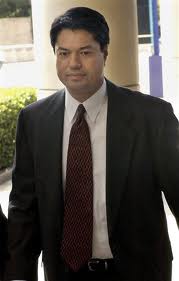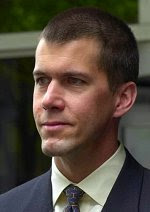 Peter Lattman notes this Jeff Smith/Rocky Mountain News article on Cliff Stricklin, the former Enron Task Force prosecutor who is gearing up as lead prosecutor in the upcoming criminal trial in Denver of Joseph Naccio, the former Qwest CEO. Naccio is charged with several fraud counts alleging that he sold over $100 million of stock during the first five months of 2001 while knowing that the telco’s finances were weakening. Naccio contends that he believed that the company’s finances and prospects were fine, and that his stock sales were simply a diversification strategy that he was pursuing at the behest of his investment advisors.
Peter Lattman notes this Jeff Smith/Rocky Mountain News article on Cliff Stricklin, the former Enron Task Force prosecutor who is gearing up as lead prosecutor in the upcoming criminal trial in Denver of Joseph Naccio, the former Qwest CEO. Naccio is charged with several fraud counts alleging that he sold over $100 million of stock during the first five months of 2001 while knowing that the telco’s finances were weakening. Naccio contends that he believed that the company’s finances and prospects were fine, and that his stock sales were simply a diversification strategy that he was pursuing at the behest of his investment advisors.
Although the article describes Stricklin’s goal of keeping the Naccio trial simple, it does note Stricklin’s dubious (and rather complicated) handling of the trial of the first Enron Broadband case, which ended in a crushing prosecution defeat:
In the Enron Broadband case in 2005, Stricklin failed to win convictions against the five former executives on trial. Three were acquitted on some charges, and the jury deadlocked on charges against the other two.
During the trial, the prosecution presented a videotape it said had been shown to stock analysts in 2000 when it hadn’t, a mistake Stricklin apologized for in his closing arguments. Stricklin also had to rebut defense arguments that some of the prosecution witnesses had tailored their testimony out of fear of being charged themselves.
That description soft-pedals Stricklin’s performance in the first Enron Broadband trial, which — as noted earlier here — exemplified the DOJ’s “anything for a conviction” attitude toward businesspeople in the post-stock market bubble era. Stricklin might also remember to be careful about what he asks on re-direct examination of cooperating witnesses during the Naccio trial.




 Jamie Olis, the former Dynegy mid-level executive whose prosecution and sentencing represents one of
Jamie Olis, the former Dynegy mid-level executive whose prosecution and sentencing represents one of 

 It’s been anything but a smooth ride for Austin-based Dell, Inc. since founder Micheal Dell announced that he was stepping aside as CEO almost three years ago.
It’s been anything but a smooth ride for Austin-based Dell, Inc. since founder Micheal Dell announced that he was stepping aside as CEO almost three years ago.